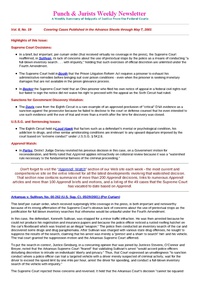Loaded on
May 1, 2001
published in Punch and Jurists
May 07, 2001
In this continuing saga of a mentally unbalanced pre-trial defendant accused of killing Capitol Police, the Court ordered his forced medication with antipsychotic medication as medically appropriate to enable him to stand trial.
Loaded on
May 1, 2001
published in Punch and Jurists
May 07, 2001
Here the Court held that even substantial assistance with government aims does not alone raise an inference that the government's failure to file a substantial assistance motion was improperly motivated.
Loaded on
May 1, 2001
published in Punch and Jurists
May 07, 2001
In this case the Court overturned a special condition of probation requiring that the defendant "shall not possess a computer with Internet access throughout his period of supervised release." (Id., at 1201). The Court found the condition simultaneously too narrow and overly broad. (Id., at 1206). The condition was …
Loaded on
May 1, 2001
published in Punch and Jurists
May 07, 2001
Here the Court resolved a long-standing Circuit split and held that 42 USC § 1997e(a) requires a prisoner to exhaust all available prison grievance procedures before commencing suit in Federal courts applies even when seeking monetary damages.
For several years now a conflict has simmered in the Circuits …
Loaded on
May 1, 2001
published in Punch and Jurists
May 07, 2001
This brief per curiam order, which received surprisingly little coverage in the press, is both important and noteworthy because of its strong affirmation of the Supreme Court’s obvious lack of concerns about the use of pretextual stops as the justification for full blown inventory searches that otherwise would be …
Loaded on
May 1, 2001
published in Punch and Jurists
May 07, 2001
In this case, the petitioner, Dale Becker, a prisoner in Ohio, instituted a pro se civil rights action in a Federal district court, contesting the conditions of his confinement. Upon dismissal of his complaint for failure to state a claim for relief, Becker sought to appeal. Using a Government …
Loaded on
May 1, 2001
published in Punch and Jurists
May 07, 2001
Here the Ninth Circuit reversed an award of legal fees under the Hyde Amendment, holding that the standard used by the district court which had been approved in other jurisdictions was too lenient and placed too heavy a burden on the Government.
In this case, the district court …
Loaded on
May 1, 2001
published in Punch and Jurists
May 07, 2001
Here the Court held that a Court of Appeals must deny a successive habeas application that presents a claim omitted from a prior petition, unless that claim was "previously unavailable" to the prisoner.
Here the Court held that, while 28 USC § 2244(b)(2)(A) provides an independent reason for …
Loaded on
May 1, 2001
published in Punch and Jurists
May 07, 2001
Here a divided en banc court held that, when resentencing a defendant in light of a retroactive amendment to the Guidelines, a district court may not grant a defendant a downward departure based on extraordinary post-sentence rehabilitation.
This case deals with the propriety of using a defendant’s exemplary …
Loaded on
May 1, 2001
published in Punch and Jurists
May 07, 2001
Here, on a motion for reconsideration, Judge Dorsey firmly ruled that Apprendi applies retroactively to cases on collateral review because it was a "watershed rule necessary to the fundamental fairiess of the criminal proceeding".
Last year, in a decision reported at 117 F.Supp.2d 204 (D.Conn. 2000), Judge Dorsey …
Loaded on
May 1, 2001
published in Punch and Jurists
May 07, 2001
Here the Court held that a defendant's mental illness, psychological condition, substantive abuse, or other ameliorative conditions are irrelevant to a district court's order of an upward departure based on extreme conduct under USSG 5K2.8.
This case is noted for its brief discussion of U.S.S.G. § 5K2.8, entitled …
Loaded on
May 1, 2001
published in Punch and Jurists
May 07, 2001
Recently we have seen a number of cases that have emphasized a distinction between “horizontal” and “vertical” departures under the Guidelines. Most of those cases have raised the issue in the context of waivers of appeal rights: when a defendant agrees in a plea agreement not to seek any …
Loaded on
May 1, 2001
published in Punch and Jurists
May 07, 2001
Here the Court held that where a defendant would be subject to a sentence enhancement anyway due to a prior felony drug conviction, and the current conviction is below the statutory maximum, Apprendi is inapplicable.
